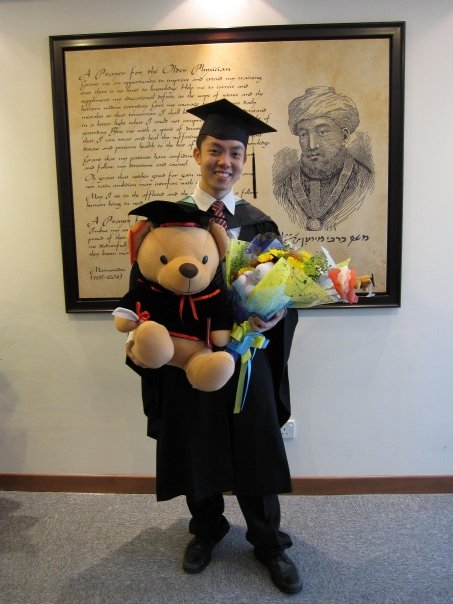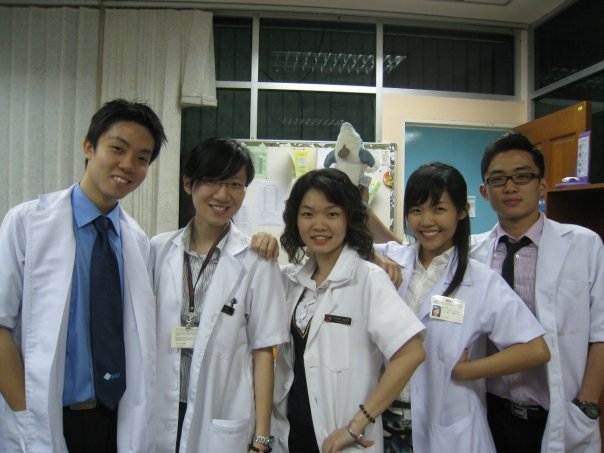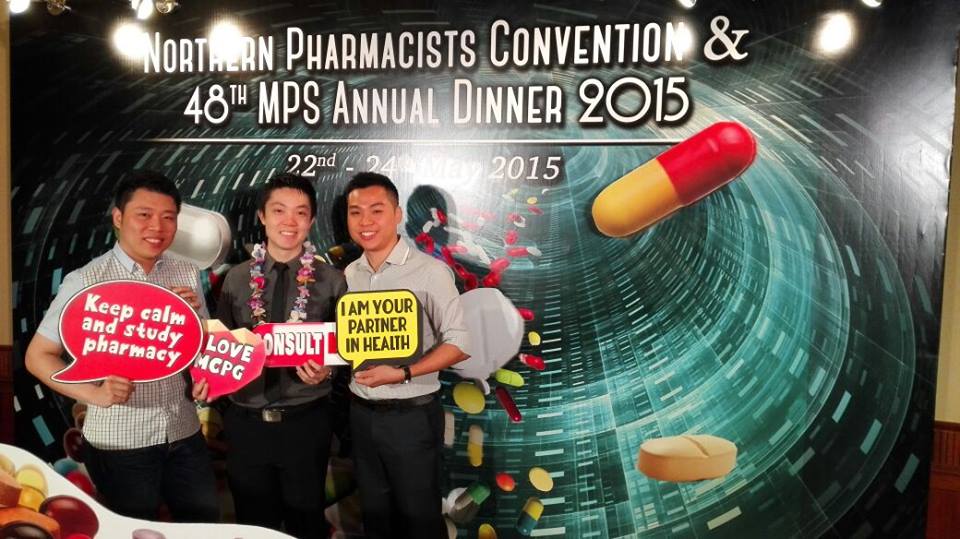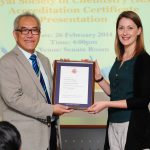My journey as a pharmacist began when I signed up for IMU’s Bachelor of Pharmacy (BPharm) programme’s four-year course during IMU’s Open Day back in 2005. I could still vividly remember the first day of our orientation where 80 young students were brought together into the main lecture hall for a “White Coat Ceremony”, where we pledge our commitment to serve the public to the very best of our abilities as future pharmacists. To cut a long story short, after four arduous years of studying and passing tonnes of exams, our big day came on 2 June 2009 where we were proudly conferred with the official title of pharmacy graduates. 
 I was then posted to Hospital Tuanku Jaafar (HTJ), Seremban on 4 September 2009 to serve as a Provisional Registered Pharmacist (PRP), rotating between 10 different departments which include Total Parenteral Nutrition (TPN), Cytotoxic Drug Reconstitution (CDR), Therapeutic Drug Monitoring (TDM) and Outpatient Department (OPD). Being thrust into the real working world for the first time was definitely a very daunting experience. We had to be extra careful in performing our daily duties as the slightest mistake may cause a huge impact on our patients’ lives. This was especially true for departments such as TPN, CDR and TDM where there were many calculations required to advise my fellow medical colleagues on the appropriate drug dosages. Not wanting to take chances with my patients’ lives, I searched and read many journals and publications to better equip myself with adequate knowledge to better discharge my duties.
I was then posted to Hospital Tuanku Jaafar (HTJ), Seremban on 4 September 2009 to serve as a Provisional Registered Pharmacist (PRP), rotating between 10 different departments which include Total Parenteral Nutrition (TPN), Cytotoxic Drug Reconstitution (CDR), Therapeutic Drug Monitoring (TDM) and Outpatient Department (OPD). Being thrust into the real working world for the first time was definitely a very daunting experience. We had to be extra careful in performing our daily duties as the slightest mistake may cause a huge impact on our patients’ lives. This was especially true for departments such as TPN, CDR and TDM where there were many calculations required to advise my fellow medical colleagues on the appropriate drug dosages. Not wanting to take chances with my patients’ lives, I searched and read many journals and publications to better equip myself with adequate knowledge to better discharge my duties.
During my OPD rotation, I faced many challenges including remembering various drug brands, dosages, locations of the drugs among dozens of shelves, counselling points as well as deciphering the doctor’s handwriting! Thankfully, there were some Fully Registered Pharmacists (FRPs) and assistant pharmacists who were very patient and willing to guide me by sharing their knowledge and counselling tips with me. As I believe in the motto “Practice Makes Perfect”, I bought myself a little notebook and jotted down various drug names and brands in alphabetical order to help me better remember all the important drugs.
After I obtained my FRP registration, I was posted to Klinik Kesihatan Gemencheh, Negeri Sembilan to serve as the unit head cum pharmacist at that outpost. As no FRPs have ever been sent to KK Gemencheh before, there was no proper system in place to manage that clinic. I discovered many expired drugs which were left idle in the fridge and drug shelves, mould growing in the drug store room, air-conditioning unit that was not functioning, and records of drug requisitions and transfers that were not updated and filed appropriately. The Queue Management System (QMS) was spoilt and we had an average of 450 patients daily with only a FRP and two assistant pharmacists! We were already very understaffed, yet I was asked to also set up a Diabetes Mellitus Therapy Adherence Clinic (DMTAC), Respiratory Therapy Adherence Clinic (RTAC) and a Methadone Clinic, both at KK Gemencheh and KK Air Kuning located 25 km away!
| The most pressing issue was to first tackle the spoilt QMS as we cannot afford to dispense the wrong medication to the wrong patient. Hence, I printed out a series of numbers in little squares from #001 until #300 in two sets of colours – red and green. We did not have a laminating machine at KK Gemencheh to laminate those numbers, so I used cellophane tapes to delicately plaster atop each number. Once those numbers were ready, I instructed my assistant pharmacists to pin the red number (e.g. #001) onto the medication slips given by patients, while the corresponding green number (e.g. #001) was to be held by the patient. During dispensing, both numbers must match before the medications are given to the patients. Once this manual system was in place, I immediately requested for extra budget from KK Tampin, which was the district health clinic that manages various health clinics at the periphery. I contacted three different companies, obtained different quotations, spoke to various contractors, and after three months of performing manual QMS, we finally managed to install a brand new QMS in KK Gemencheh. Being able to see the happy faces of my staff and patients make all the effort worth it. |
Since the QMS issue has been settled, I requested for an additional budget to repaint the store room with antifungal paint, contacted repairmen to service the air-conditioning unit and rearranged the drugs alphabetically. I drew up a timetable for my staff to ensure sufficient drugs are packed on time, checked periodically and records updated progressively. As I was based full time at KK Gemencheh running the methadone clinic, I made an agreement with the doctor to cover the methadone clinic at KK Air Kuning twice a week to ensure that the patients there could still obtain their necessary treatment. It was through sheer determination and persistence that I was also able to manage both the DMTAC and RTAC on top of the two methadone clinics.
Towards the end of 2011, there was an issue on allowing FRPs to leave their compulsory service even before completing four years of service. As this issue is very close to my heart, I wrote a newspaper article (which was subsequently published in The Sun), arguing why FRPs should be allowed to leave after completion of one year of PRP and one year of FRP. Fortunately, the then Health Minister, Dato’ Seri Liow Tiong Lai allowed all FRPs who have completed a total of two years of service to leave the compulsory service. Hence, I left government service at the end of 2011 for better opportunities at the private sector.
Subsequently, I joined a community pharmacy as a pharmacist cum branch manager. Besides providing counselling services to customers, I have to oversee the daily operations of the shop, bank-in the daily takings, draw up staff’s timetables, and manage inventory levels while ensuring appropriate sales and margins. Here, I picked up many valuable lessons as working in the private sector is a totally different ball game. Aside from providing the normal services that are required of a pharmacist, I have to also ensure that the company is making a profit. The competition at times is intense due to the numerous standalone and groups of pharmacies competing for the same customers. I subsequently moved on to another group of pharmacy chain under a public listed company.  Each move in my career involves more responsibilities and my present position is the Senior Manager in-charge of vitamins in Guardian Pharmacy. As this is the largest segment within the health category, the pressure and expectations are exceptionally high. I need to ensure that the correct products are brought into Guardian at the right price. Then, with attractive promotion mechanics to drive sales at the stores. Other tasks include forecasting sales accurately and advising appropriate inventory levels to be maintained by the company. Due to the fast nature and growing competition within the retail pharmacy industry, it is vital that Guardian obtains the best deal from its suppliers, hence the art of negotiation comes into play – to ensure that both parties benefits. I have to come up with growth strategies to distinguish Guardian from the rest of the pack, which includes obtaining exclusive promotional packs, launching health events to enhance the company’s brand among consumers, work with suppliers to print and distribute educational leaflets to the public, rallying suppliers to provide training sessions for our pharmacists, revamp the entire vitamins’ shelves with educational boards for easier navigation by consumers and to develop and expand Guardian’s own brand of vitamins and supplements.
Each move in my career involves more responsibilities and my present position is the Senior Manager in-charge of vitamins in Guardian Pharmacy. As this is the largest segment within the health category, the pressure and expectations are exceptionally high. I need to ensure that the correct products are brought into Guardian at the right price. Then, with attractive promotion mechanics to drive sales at the stores. Other tasks include forecasting sales accurately and advising appropriate inventory levels to be maintained by the company. Due to the fast nature and growing competition within the retail pharmacy industry, it is vital that Guardian obtains the best deal from its suppliers, hence the art of negotiation comes into play – to ensure that both parties benefits. I have to come up with growth strategies to distinguish Guardian from the rest of the pack, which includes obtaining exclusive promotional packs, launching health events to enhance the company’s brand among consumers, work with suppliers to print and distribute educational leaflets to the public, rallying suppliers to provide training sessions for our pharmacists, revamp the entire vitamins’ shelves with educational boards for easier navigation by consumers and to develop and expand Guardian’s own brand of vitamins and supplements.
IMU has indeed provided me with the knowledge and opportunity through their numerous and dedicated lecturers so that I am able to move ahead in this noble profession. For that, I am eternally grateful to all my lecturers who have sacrificed their sweat and tears for without them, I would not be where I am today.
For those aspiring to take up this career, I urge you to always work hard, keep an open mind, stay humble and most importantly – master the art of listening! I would like to thank IMU’s Alumni Office for providing me the space and opportunity to share my experiences. I would like to end my story with a quote: “If you put your mind to it, you can accomplish anything”- George McFly
Written by Jason Law Han Keong, an IMU pharmacy alumnus.









